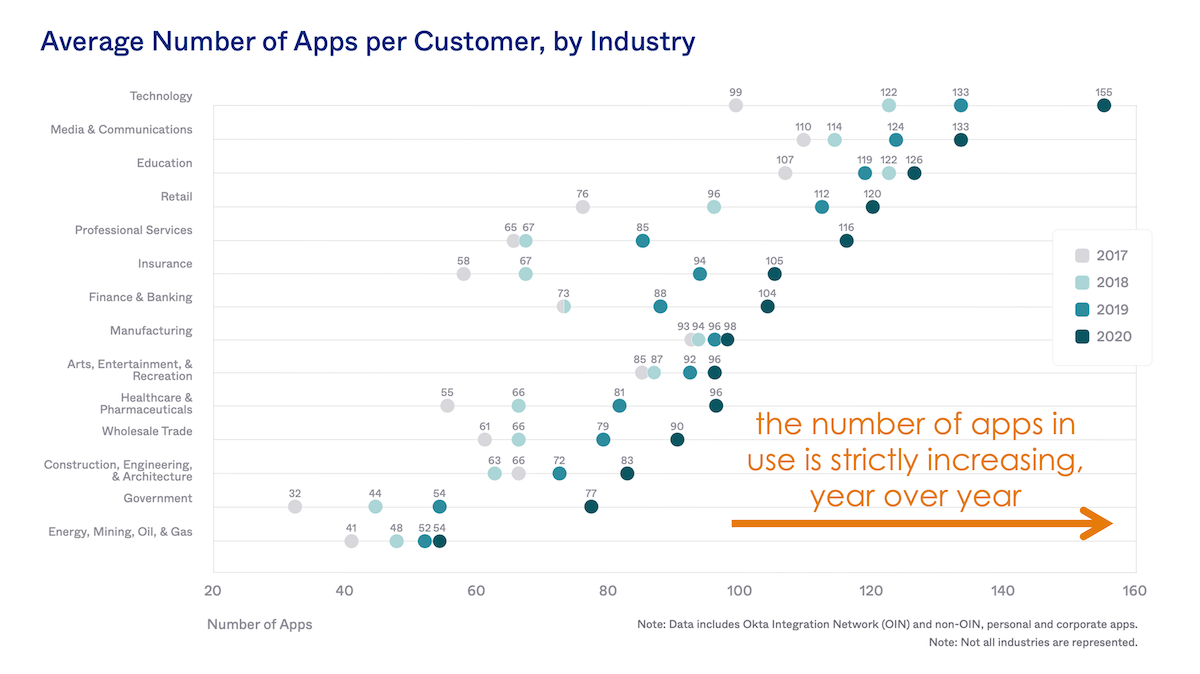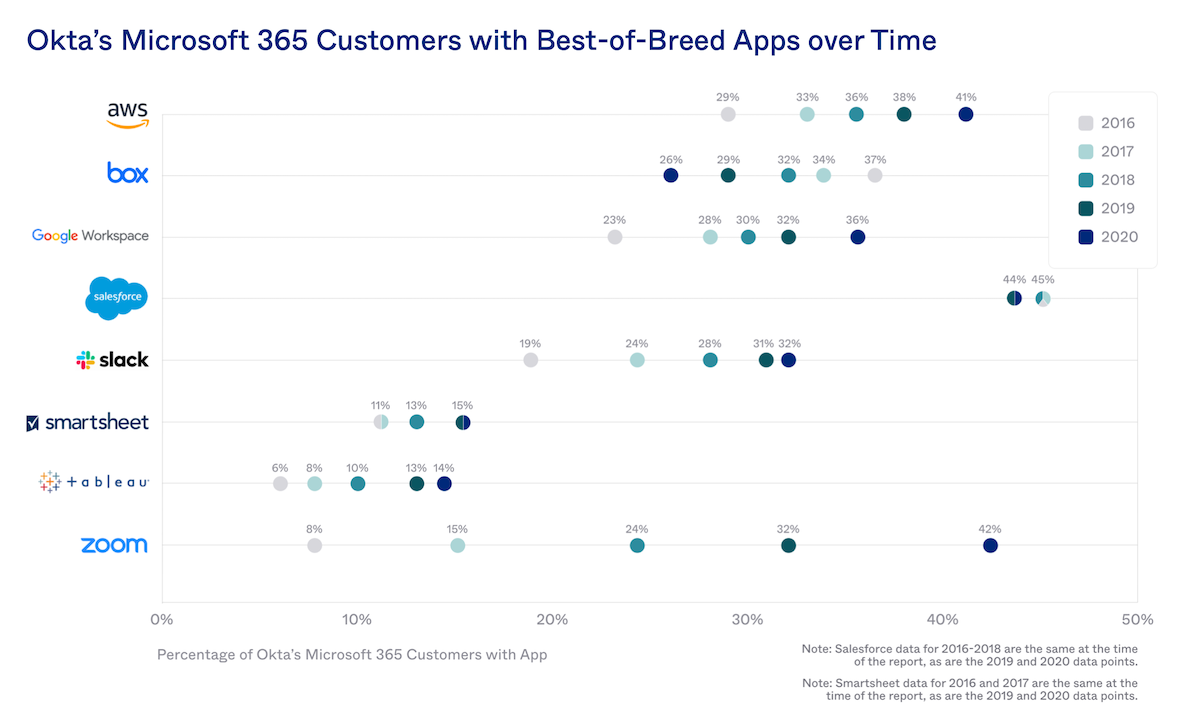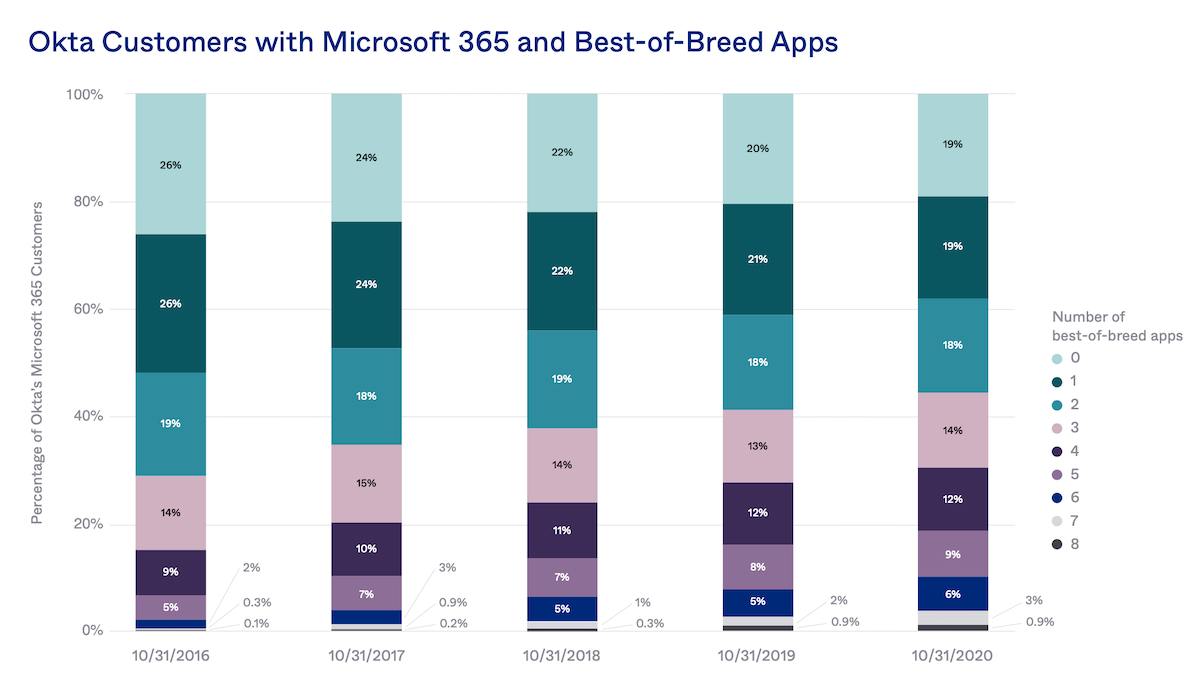It’s been my opinion, expressed in numerous editorials — hey, that’s what op-ed means! — that business technology stacks (and martech within them) are expanding and that they are increasingly “best-of-breed,” incorporating more apps and services built by many different companies. (It’s also my opinion that those best-of-breed apps increasingly orbit foundational platforms. But that’s an op-ed for a different day.)
But as they say, opinions are like, um… well, let’s just say everybody has them.
So I rejoice every time I find hard data that empirically reveals the ground truth. And when it comes to hard data about stacks of apps, the best sources of such data are independent products that sit in the middle of these stacks to manage and govern them.
Okta is one of those products, an industry-leading platform for identity management and single sign-on. They handle the daily logins to many of the apps in enterprise stacks, so they know for a fact what’s being used. And — bless their hearts — every year, they publish a Business at Work report that shares those stats in aggregate from more than 9,400 customers.
They just released their 2021 report, and as you can see from the graph at the top of this post, the data reveals a pretty unequivocal trend: the number of apps in business stacks is strictly increasing.
Stack sizes vary quite a bit from industry to industry. Tech companies are super app rich, with an average 155 apps (up 17% in just the past year). Oil and gas companies have the fewest apps — I’ll leave wry remarks on that as an exercise for the reader — but still ~54 on average, which isn’t exactly small.
But across every industry, the count is rising. The overall average is 88 apps, having grown 22% over the past four years.
Now, one point of methodology to acknowledge. Okta is counting apps that are connected to its identity platform. So it doesn’t “see” any of the other apps a business might be using that don’t authenticate through its system. In other words, the actual size of business stacks is almost certainly larger. However, the year-over-year growth in the data that Okta is reporting may also reflect existing apps that were newly connected to Okta, but not necessarily net new apps added to the stack.
Now what about best-of-breed?
To answer that question, Okta looks at the number of companies who have adopted Microsoft 365 — as full-function of a popular suite of business apps as you’ll find anywhere — who have also adopted overlapping products from other vendors.
For example, even though Microsoft Teams comes standard with the Microsoft 365 Business Basic subscription, in Okta’s data, 42% of those customers use Zoom and 32% use Slack. Even though Microsoft Project is available, 15% of them use Smartsheet. Even though Microsoft Power BI is available, 14% of them use Tableau. And so on. With the exception of Box, which appears to be steadily losing ground to Microsoft OneDrive, most other best-of-breed combinations are growing — in many cases significantly.
And despite the perennial cries of “The sky is consolidating! The sky is consolidating!” of pundit opinions, the data tells the truth: over the past five years the number of best-of-breed apps paired with Microsoft 365 in Okta’s universe has steadily increased.
One last point worth noting. The apps tracked by Okta aren’t all commercially packaged solutions. The reason AWS shows up is because Okta is also being used as an authentication mechanism for custom apps that a company builds and deploys on cloud platforms. (See The Great App Explosion and my review of Ask Your Developer to dig into why that’s a perfectly valid growth path for stacks that I’m convinced we’ll see more of.)
And again, in the best-of-breed camp: 41% of Okta’s Microsoft 365 customers are using AWS, even though Microsoft Azure would be the “suite-r” (sorry) choice. And that percentage has been consistently growing too.
So are the numbers of apps in business stacks increasing? The data says yes.
Are these stacks best-of-breed? The data says yes too.
Less opinion, more fact.
Thank you, data. (And thank you, Okta!)
Get chiefmartec in your inbox
Join 42,000+ marketers and martech professionals who get my latest insights and analysis.


